- Home
- Barry Unsworth
The Ruby In Her Navel Page 2
The Ruby In Her Navel Read online
Page 2
He smiled a little, saying this; he had the Arab love for word-play and reversed figures. I for my part felt some beginning of relief. He had spoken of a mission, but where was the mission in this?
"If we are to refuse them, there is no need for a meeting," I said.
"On the contrary, there is every need. If you are there in person to refuse, it will strike them the more. You are there, before their eyes.
You are only the reach of a hand away. They reach out their hands, and lo, you give them nothing. The situation is serious for us; perhaps by these means we will make it more serious for them."
His tone had deepened slightly during these last words, a sign of feeling which he was perhaps not aware of. There was a gesture too that betrayed him. He wore as a talisman a scroll inscribed with the 99 names of God in an embroidered leather case carried on a silk cord that passed over his left shoulder and across his body. In times of anxiety he would touch this case, brushing it slightly with his fingers. Unlike many of the Saracens in the Royal Diwan, who had converted to Christianity, Yusuf had kept the faith of his fathers.
That the matter was serious there could be no doubt. We were facing the most formidable military alliance anyone could conceive. Apart from the danger to our realm, we both had much to lose personally. Yusuf held great power in his hands, but the rise of the Vice-Chancellor's Office was calling some of his prerogative into question. And now the King was to create a new post, that of Royal Chamberlain, with powers of supervision and control that extended over both Offices in all matters of finance, renewal of privilege and grants of land. He who gained this post would be second in power and influence only to the King's First Minister, the Emir of Emirs, who at that time was George of Antioch.
Yusuf wanted this post and on all hands he was spoken of as likely to obtain it. If he did, there was a good possibility that he would put my name forward to succeed him in his present position as Lord of the Diwan of Control. Then I would become rich like him, and have concubines, and white horses with gilded trappings, and Saracen attendants in uniform to make way for me in the streets, and a mansion of my own with gardens. I would inherit the marble frieze and the fretted ceiling and the breath that came through the moulded casement of the window. I would send others on missions to meet people like Lazar. Yusuf had never made promises to me, but I was close to him, though different in most respects. He was not a man to demonstrate great warmth of feeling, but I knew he had some tenderness for me.
In a few words now he told me what he had in mind for me. We were then near the end of April and the great pilgrimage to Bari in Apulia was already under way. From all over Europe, from Scandinavia and the Baltic, from Russia and the lands of the Slavs, bands of pilgrims were making slow convergence on the town of Bari for the Feastday of Saint Nicholas, to visit the church where his holy relics were kept and wet their lips with the miraculous oil which was exuded from his uncorrupted body and had power to heal the sick and the lame. I would join this throng, I would travel to Bari in the guise of a pilgrim and there I would meet Lazar and deny him the gold.
First, to lend natural colour to my setting out, I would go in my own person, and openly, to Calabria, and there I would purchase the small white herons that are trapped at this time of the year in the marshes that lie between the town of Cosenza and the sea. I would have them shipped back to Palermo to restock the Royal Falconry – the King liked to use these swift-flighted birds for his goshawks. This accomplished, I would cross the peninsula on horseback. At a distance from Bari I judged suitable I would leave the horse and proceed on foot with hood and staff and satchel and mingle with the crowds of the pilgrims.
"For the herons you must not exceed eight folles per bird," he said.
"And that includes the price of the cage."
I could not help smiling at this. No detail was too small for him; he must have been to the falconers to get this figure. "Supplying birds for the King's sport has never been among my duties as purveyor," I said.
"Why does the usual person not go?"
"I have enquired into it. The usual person was Filippo Maiella and he decamped with the money last year and has not been seen since. A highly respected man in the Diwan of the Protonotary, he went to Calabria year after year to buy these birds. Twelve years at least. Then last year, only Allah the All-Merciful knows why, who knows all things, he disappeared with the purchase money."
There was wonder in Yusuf's voice at a wildness so foreign to him, so much at odds with his own ordered life. "He walked away, he left everything," he said, and while the amazement still lingered in his voice I was assailed without warning by a demon, struck with sudden envy for this thievish Filippo. I knew it must be a demon who stabbed me thus: such a feeling could not dwell within me, who was always so careful, who counted every follaris of the King's money. "He must have taken leave of his senses," I said, thinking of him there, with the money in his purse, setting his face towards the mountains and the sea.
"It was thought at first that his guards had murdered him and hidden the dinars," Yusuf said. "They were watched, but such people do not wait long if they have money to spend, and it was soon clear that these had not."
"Where will the meeting with Lazar take place?"
"In the Basilica, beside the steps that lead down to the crypt."
"That will be his idea. The area round the steps will be crowded, the people will be jostling to get down to the crypt, to the tomb of the saint."
"No doubt that is his reason, In such a throng you will be the more likely to escape notice."
I looked at him in silence for some moments. His face wore its usual look of patient shrewdness. He was sending me. He did not want me to come to harm; he may not have had much faith in the results, may even have felt, with me, that standing still in a moving throng of people is not the best way to escape notice. But such missions formed part of the powers and prerogatives of his Diwan; they had to be exercised or they would be lost or expropriated, and that would leave him the weaker.
"Lord," I said, "I am ready to do anything you ask of me, no matter what, but it is a long way to go, just to show empty hands."
"We work by signs and gestures. Do you not know this yet? The money has the same importance whether it is absent or present. There is a verse in the Koran which speaks of this: "But that mankind would become one people we would have given those who denied merciful God silver roofs for their houses and stairways to mount to them."
I nodded as if I fully understood this, which was far from being the case. In fact, I was often at a loss to understand quotations from the Holy Book of the Moslems. I thought this one might mean that God did not set store by gold or silver, but I did not see the relevance of this, as we were talking about Lazar, who set great store by both.
"The pains we take are part of the message," Yusuf said. "He will have to take great care in making this clear to his own people, who will be angry with him, not with us, and who may be inclined to regard him as a spent force and seek to replace him. You see, Thurstan Beauchamp?"
He used my name always, my full name, when he knew I was opposed and he wished to create an understanding between us, as if I were a child, unwilling to see reason. And this annoyed me and touched me in equal measure, which I think he knew. When he had finished speaking he stood silent for a while. Tall and frail-seeming, with his slight, scholarly stoop of the shoulders, he more resembled one of the Arab artists and men of letters with whom our King loved to surround himself than what he was, mission-master, controller of the royal revenues, with a power that made him envied and feared, ruthless and devoted in serving this kingdom – a kingdom that his forbears had ruled for two centuries, ruled now by a Norman king, whose father and uncle had landed in Sicily as penniless adventurers and taken the island by conquest.
He started slightly now, as if he had forgotten something, or allowed himself too much pause, too much silence. Then he inclined his head, said a brief word of farewell to me and turned away. T
hus dismissed, I left at once, this time not passing through the antechamber but stepping directly out into the passage, which followed the line of the wall facing towards the city. At the far end of this there were steps that led down in a spiral to the courtyard on this side. There was a narrow landing at the first curve of the staircase and in the recess of the wall an open casement with, at this hour of the day, sunlight slanting through it onto the steps and making a spill of light there. As I approached this I heard the wavering cries of the muezzins calling the faithful to prayer from the balconies of minarets throughout the city. I understood now why Yusuf had been so abrupt in his farewell: it was the noon call, he had heard the first notes.
I stopped and stood still there before the opening, as I had sometimes done before; it was scarcely two spans across at the broadest point, but I could see a section of sky through it. Yusuf would have needed time to summon his servant to bring water for the ritual ablution of his face and hands… I had been encouraged by him to use a faculty of picturing, of turning imagination like a directed light, a ray, on to the movements, thoughts, habits of others, to keep their continuing existence in my mind, see them in their times of vacancy or solitude, when they were unguarded. Where would such a person go, what might he do next? Even in the intimate details of his bodily life I would follow him. It was Yusuf, as I say, who had fostered this in me; now I turned the ray on him. He would shake his narrow feet loose from the slippers, he would clap his hands for his servant, a Berber boy slave he had named Matthew, who had a mat on the floor in the adjoining room. Matthew would know what to do without needing to be told. He would bring the ewer of water and the towel; he would pour the water very slowly into the basin that was always there; as the water flowed from the neck of the ewer, Yusuf would catch it in his hands and bring it to his face and wet his ears and nostrils and eyes and mouth, so that the organs of sense could be cleansed before he turned towards Mecca and intoned the intention to pray.
All this takes long to write, not long to see in the mind. The call was still continuing, rising from all directions, far and near, testifying to the greatness of God, calling upon the faithful to come to salvation, a clamorous melodious hubbub that fell on the city five times a day, confused by varying distance and the overlapping of sound, since those chanting did not all begin at the same moment, one voice fell away as another was raised, like veils of sound laid one across the borders of another, veils that were then torn again by the movements of the muezzins themselves, since each had to address all quarters of the world and so pronounce his summons four times, each time facing in a different way. It was a ragged music, deeply familiar to all who had their lives in the city, and moving in its confusion, to me at least, though a Christian – like the loud plaints that lambs make, lost on the hillsides, one answering another near and far, which I remember from the dales of my childhood in England, a chorus that always seemed to me like sorrow and joy at the same time.
Now, as I still stood there in the thin shaft of sunlight, in response as it seemed to the human voices, but not in rivalry, there rose the brazen voices of bells from monasteries and churches all over the city announcing the noon hour and the office of sext. And now again there was a confusion of sound, the clear silver bells that hang inside the cloisters, the deeper ones above convent gates, the clanging, deep-throated ones mounted in the towers of churches. For some moments more the throats of men and bells made that medley of loss and celebration, and as I glanced upwards at the section of sky that was visible through the window I saw the swift-winged birds that live in the sky above the city and never alight on the ground, saw them flock together in the bright air, rising above the sound, not as in fear but as in joy.
With this I was swept by a familiar love for this city of Palermo, where I had spent most of my years, for the diversity these sounds expressed, the different faiths that lived together here, the different races that jostled in the markets and laboured on the buildings that were rising everywhere, praying apart and having their cases tried in their own tongues, but all held together in unity by our great King. I thought of him now, the times on state occasions I had seen him, always at a distance. He rode with a canopy of pale-coloured silk stretched above his head, and the light that fell through it seemed to obscure his face, a radiance that obscured. I had no picture in my mind of the King's face.
From here I could not see the Pisan Tower, where the Royal apartments were, but I knew he spent his morning hours there, in the audience chamber on the second storey. He would be there now, hearing ambassadors or studying documents that touched the lives of us all, or perhaps scanning details of the revenues from his estates – in that case, his eye might fall, just for the merest moment, on an entry I myself had made, some item of expenditure. He would see the marks I had traced! A sense of wonder descended on me with this thought, wonder at his nearness and farness. I tried to picture him, as I had just pictured Yusuf, but I could not, he was beyond my imagining, divinely appointed as he was, by God's grace invested with the sceptre and the orb. I was eight years old that Christmas Day when he was crowned in the cathedral of Palermo. I saw him then for the first time, standing with my father in the ranks of the nobility. My father lifted me up and I saw him pass in sunlight and he was in a mantle of gold and the bridle of his horse was gold and its hooves made no sound because of the carpets they had laid over the pavement.
I had lived ever since in the protective shadow of his power. I felt ashamed now that I had been so grudging and reluctant in the way I had received the news of my mission to Bari, when it was in his service that I was sent. My life up till that time had contained disappointments. In fact it had sometimes seemed to me that it was my fate never to arrive at a promised end. I had wanted with all my soul to fight in the King's cause as a knight and it had not been granted to me for reasons I will give more fully later. I had sought a command in his Household Guard and this too had come to nothing because Yusuf had taken me from it. He had noticed me and greeted me in Arabic and I had answered him in the same language, which I knew, though at that time imperfectly, from the Arab nurse my parents had given me. With these few words I gave him in answer my life was changed. I was to learn that he had wanted more Christians in the Diwan, to broaden the base of his power. One like myself, of the Latin faith and of Norman descent, had been particularly suitable for this purpose of his. He had other reasons also, which I only learned later.
He had sent me to study Roman Law at Bologna, so as to argue cases affecting the King's temporal power against ecclesiastical claims where property or revenue were involved. I studied but I felt no vocation for the law and I was not among the most brilliant there. I had more success in the taverns, where I added to my stock of songs, both those in Latin that the students sang and the new ones in French that were coming from Poitou and Aquitaine. Somehow, returning to Palermo and the palace service, I had become purveyor of pleasures and pursebearer. Service in the sun, in the open, with no handling of coin, this is what I would have wanted. But I could still be of use to him in the shadows. And was I not going openly to Cosenza to buy for him the white marsh birds that he so loved to serve to his falcons?
Set aglow by these thoughts, I turned from the window to continue my way down. As I did so by chance or by some instinct, I glanced behind me at the way I had come. There was a man at the head of the stairway, standing quite still, watching me. After a moment I knew him for Maurice Béroul, an ordained priest, employed now in the legal department of the Vice-Chancery as an advisor in matters touching canon law. He had been present at the majlis but had not spoken. He did not speak now, though he seemed for a moment to hesitate as if he might come towards me. Then he turned, took some steps back along the passage and disappeared from view.
II
The stairs ended on the landward side of the palace, opening into a walled courtyard with a narrow portico and a fountain. Here I came upon Mark Glycas, who was taking the air in the shade of the arches, walking slowly, with his ga
it of an old man, unsteady and dragging. He had his back to me and did not hear my step. He did not see me until he came to the end of his paces and turned about, which he did by slow degrees – all his movements were slow except those of his head, which had an upwards motion, rather frequent, as if he were following some faint sound in the air above. He was bare-headed, by which I knew he had come only for this brief respite from his writing-table.
He gave me good-day and would have resumed his walk, but before he could do so I asked him the usual question, the same that he had been asked for twenty years: "And the studies, how are they proceeding?"
"We are building up a case," he said, his usual answer. "Yes, slowly and surely we are building up a case."
No one knew how old Glycas was. He had grown grey and his eyes had dimmed in the King's service, saddled always with the one task: to find convincing evidence, evidence that could be published, that Sicily had once, however long ago, been ruled by kings. If this could be done, it would make clear that our good Roger, in taking the crown, had not invented the monarchy or imposed it on the people, but had merely resumed the royal line. Glycas was versed in the history of antiquity, conversant with legends and myths, adept at following up threads and finding links. He could read with equal ease the Greek of Hesiod and of Byzantium, the Latin of Ovid and of the Christian Fathers. He had brought all his enormous erudition to this task. No definite proof had so far been discovered; not many believed now that any would; some thought, and I was among this number, that Glycas was simply spinning out his time – he was comfortable there, the stipend was enough for his needs.
"Yes, yes," he said, cocking his head to catch that fugitive sound. "I am following a new line."

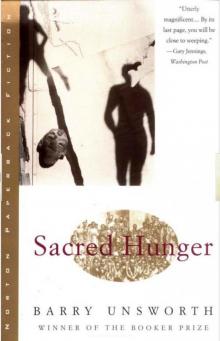 Sacred Hunger
Sacred Hunger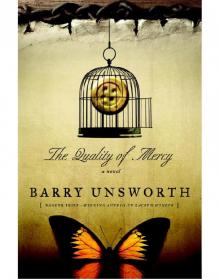 The Quality of Mercy: A Novel
The Quality of Mercy: A Novel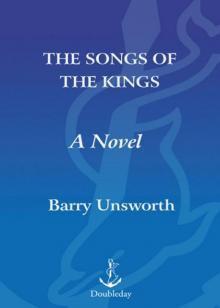 The Songs of the Kings: A Novel
The Songs of the Kings: A Novel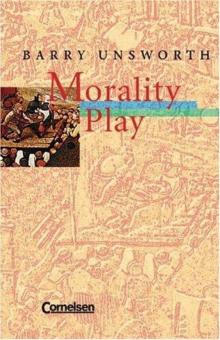 Morality Play. Mit Materialien. (Lernmaterialien)
Morality Play. Mit Materialien. (Lernmaterialien)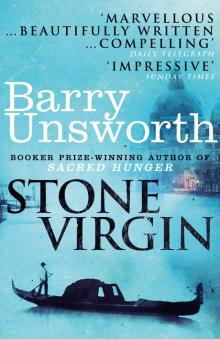 Stone Virgin
Stone Virgin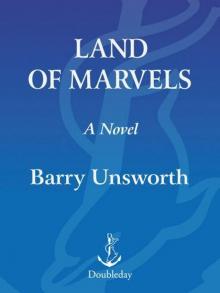 Land of Marvels
Land of Marvels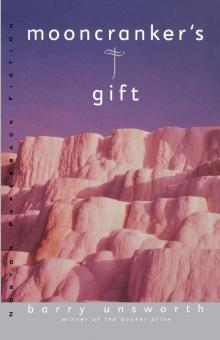 Mooncranker's Gift
Mooncranker's Gift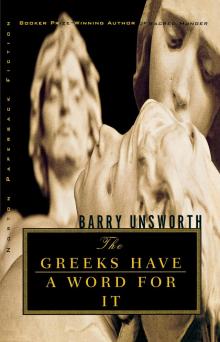 The Greeks Have a Word for It
The Greeks Have a Word for It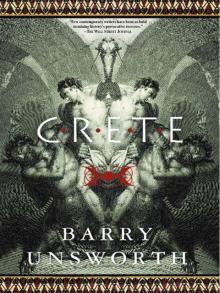 Crete
Crete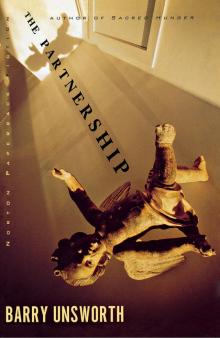 The Partnership
The Partnership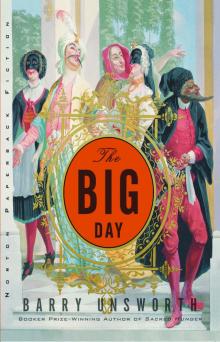 The Big Day
The Big Day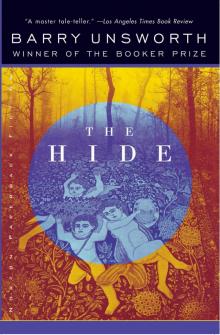 The Hide
The Hide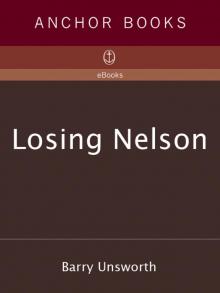 Losing Nelson
Losing Nelson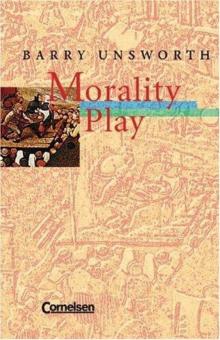 Morality Play
Morality Play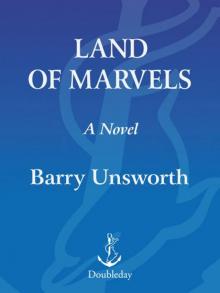 Land of Marvels: A Novel
Land of Marvels: A Novel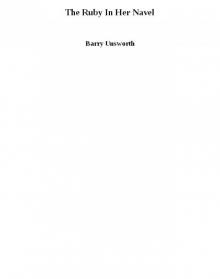 The Ruby In Her Navel
The Ruby In Her Navel